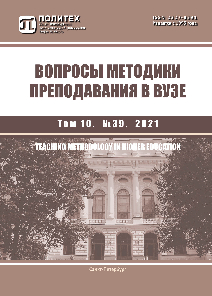Building professional student competences by means of dramatization methodology in teaching social disciplines
The article is aimed at a comprehensive analysis of the use of dramatization as a method of teaching social sciences, it gives the results of the practical application of dramatization in class at Peter the Great St. Petersburg Polytechnic University. The topicality of the study is due to the need of studying the didactic potential of the dramatization method in relation to teaching students in the humanities. The methodological basis of the article is the principle of scientific objectivity when working with the theoretical works of J. Dunn, M. Anderson, and others. David Farmer's research has made it possible to systematize a significant amount of factual information on the use of dramatic play in the teaching process, to apply special exercises and assignments in teaching. It is revealed that through the interaction of students dramatization allows to convey ideas, emotions and feelings, forming a conscious attitude towards the acquisition of professional knowledge and competencies. It is shown that dramatization helps to adapt traditional teaching technologies to new fast-changing vital realities. To analyze the effectiveness of the lessons, students were offered several options for feedback, and drawing on the results of the questionnaire, it is concluded that the dramatization technique becomes more open and focused on the audience. This is what allows dramatization to remain an effective teaching method in the information environment. Training skills in learning through dramatization is an active process, which facilitates the acquisition of skills in a short time and the preservation of knowledge in the long term. The materials of the article have a practical focus, there are several tasks as illustration of dramatization method, which can be used to teach social subjects using the dramatization method in higher education.



